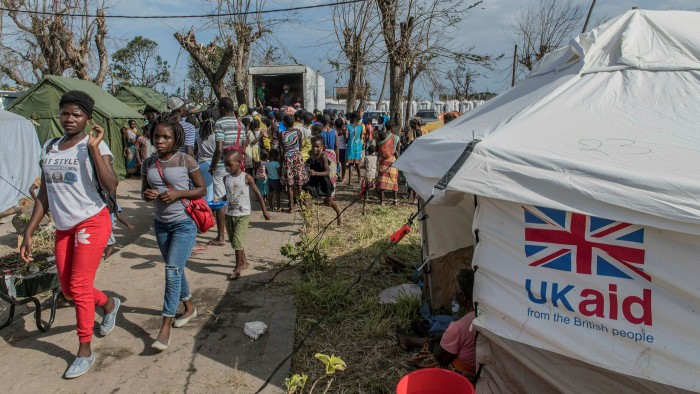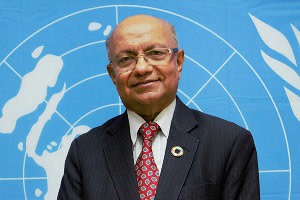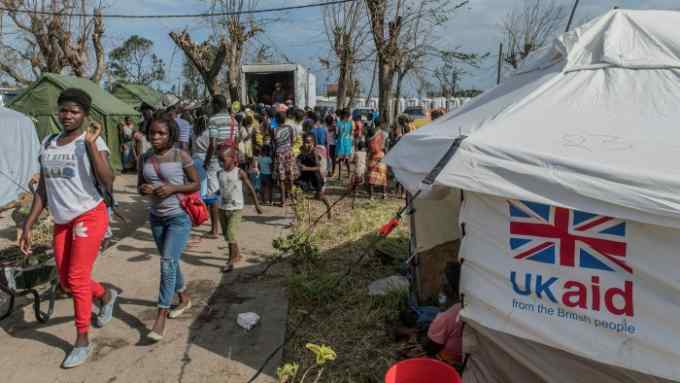Global Britain should restore its foreign aid spending pledge

Roula Khalaf, Editor of the FT, selects her favourite stories in this weekly newsletter.
The UK played a leading role in creating the post-second world war architecture of multilateral institutions, including the UN. And it has always been a pre-eminent supporter of multilateral action to tackle global poverty, conflict and humanitarian crises.
In 2013, the UK became the only G7 country to commit to 0.7 per cent of gross national income (GNI) in aid, as the UK sought to promote a “golden thread” of stable government, human rights, rule of law and transparency in global governance.
Sceptics, however, question the sincerity of the UK’s multilateral commitments, most recently in light of the decision — voted through by MPs this week — to “temporarily” reduce the aid commitment to 0.5 per cent of GNI.
The UK’s commitment to 0.7 per cent had been widely acclaimed, and public support for international development was actually on the increase. So the government should seek to ensure that its aid pledge is soon returned to 0.7 per cent of GNI and is applied in ways that are most likely to be both effective and popular, complemented by multilateral diplomacy. This could be the basis for a new and powerful vision for Global Britain.
The UK’s recent Integrated Review identifies intellectual and human capital as the major sources of the country’s “soft power”, rooted in the UK’s values, democracy and reputation for openness and innovation. Global Britain’s great soft power status is also bolstered by its extensive network of diplomatic missions in 178 countries and territories. Global Britain can harness this tremendous soft power to position itself as the pre-eminent world leader and development partner, committed to the global fight against poverty.
Effective leadership in humanitarian and development assistance, plus a stepping up of multilateralist diplomacy, and a focus on human security could form the building blocks of an exciting and radical new vision for a post-Brexit, post-pandemic, Global Britain.
The pandemic, the climate crisis, terrorism, global poverty and inequality show that we need a multilateral approach to “problems without borders”.
With its historic legacy, its role as a permanent member of the UN Security Council, and its record as a development partner, Global Britain is ideally placed to lead a renaissance of multilateral action to address today’s global challenges.
In 2021, the UK has a special opportunity to provide such leadership through the G7, the G20, COP26, the Global Education Summit, and the Food Systems and Nutrition for Growth summits.
Here, then, is a four-point agenda for Global Britain as a multilateralist global soft power:
Distinguish Britain as a multilateralist global soft power
Unlike some great powers, the UK has largely sought to fully honour the spirit of the UN Charter. The UK would be ahead of the curve if it were to strengthen multilateralism as the governing ethos in its international relations and encourage others to do the same. Post-Covid is a perfect time to make a wise and courageous choice of becoming an enlightened, multilateralist global soft power. The UK can make history as a champion of the demilitarisation of international relations and an eloquent proponent of non-military human security.Spearhead UN reform and multilateralism to enhance human security
Using its position on the UN Security Council, Britain is uniquely well placed to propose far-reaching and meaningful reforms to help make the international architecture fit for the 21st century. A centre point of such reform should be the pursuit of human security: making the world safer by preventing and resolving conflicts; addressing global disparities; strengthening livelihoods; meeting the sustainable development goals (SDGs); and giving young people confidence in the international commitment to sustainability. In this context, now is an appropriate occasion for the UK to increase its core funding for UN agencies, encouraging others to follow its lead.Champion the ‘responsibility to protect’
Many countries hide behind their sovereignty to oppress their people. When governments are involved in massive violations of their citizens’ human rights, the international community needs to act together decisively. In 2005, the UK joined the UN General Assembly agreement that the international community has a “Responsibility to Protect” vulnerable people if their own government is unable or unwilling to protect them. As a great supporter of human rights and humanitarian assistance, the world counts on Global Britain to be a foremost champion of R2P.
Focus on children
As a strong proponent of the SDGs, the UK has made a repeated pledge to focus its support on global health, girls’ education, humanitarian assistance and climate change. One way to recapitulate all these priorities is to proclaim that the centrepiece of its international development co-operation and diplomacy will be to maximise the wellbeing of the world’s children and future generations. There is no greater cause or nobler mission and such an approach is likely to garner increased public support for UK aid and diplomacy. Historically, the UK is the motherland of child rights; 2021 offers a unique opportunity for the UK to position itself as the greatest champion of bold actions for the world’s children. Young people are concerned about their future in the face of the pandemic, climate change, and global inequality. Global Britain can harness the potential of British and the world’s children and youth by investing heavily in their health, education, and wellbeing, and unleashing the collective power of multilateral co-operation to build a brighter future for future generations.

Kul Chandra Gautam is a former deputy executive director of Unicef and assistant secretary-general of the UN.
He is author of ‘Global Citizen from Gulmi: My Journey from the Hills of Nepal to the Halls of United Nations’.
Read his full essay on the Unicef website, here

Comments